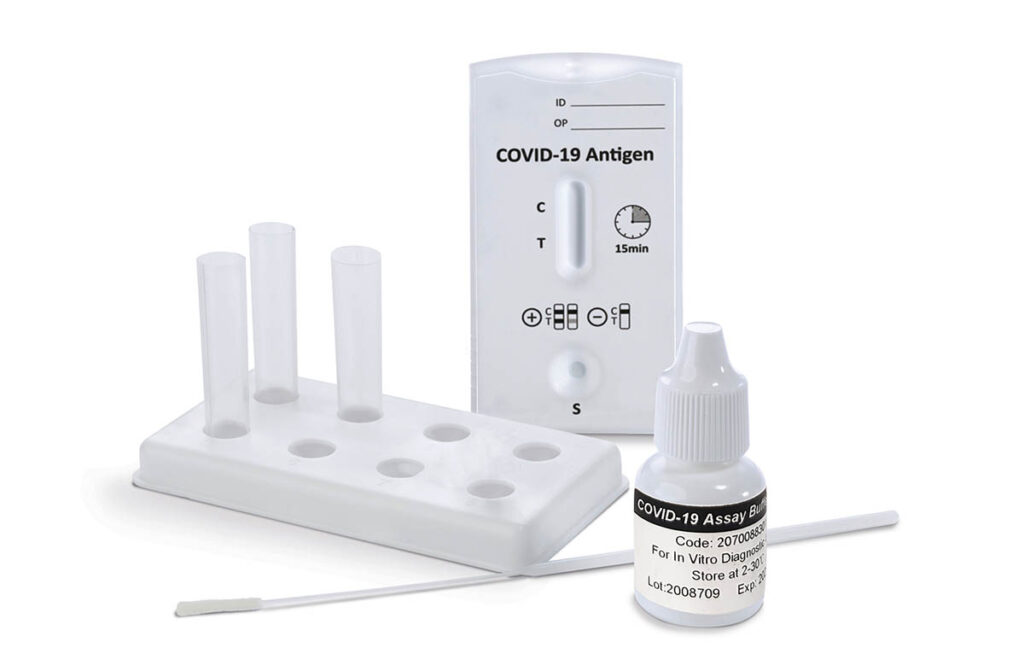The Government today announced guidelines for returning to face-to-face classes in higher education, recommending regular rapid antigen tests, asking institutions to guarantee conditions for them to happen.
According to a joint press release from the Directorate-General for Health (DGS) and the Directorate-General for Higher Education (DGES), a technical guideline was approved on the conditions for carrying out laboratory tests for SARS-CoV-2, which causes covid-19, in higher education institutions.
The strategy of regular screening, according to the note, "can be an additional measure to non-pharmacological measures for a safer return to educational activities and classroom teaching."
"The periodicity for performing rapid antigen tests in screening programs is not defined, with the most studied intervals being those of more than one test per week, one test every seven days, and one test every four days ”, advances the document.
This is because, explains the document, “the greater frequency of the use of rapid antigen tests seems to be associated with a greater reduction in the transmission of SARS-CoV-2 and with a better performance of the tests, since the increase in the frequency of their use, in the same individual, seems to compensate for the lower sensitivity of these tests (compared to nucleic acid amplification tests, that is, PCR) ”.
“For this strategy to have potential in controlling the covid-19 pandemic, regular laboratory tests must take into account the available resources in order to guarantee its feasibility”, he adds.
Among the recommendations, we highlight “the performance of a rapid antigen test to all students, teachers, researchers, non-teaching workers and collaborators who restart face-to-face activities and periodic screenings in the municipalities with a cumulative incidence over 14 days to 120 / 100.000 inhabitants ”.
Higher education institutions, public and private, must therefore guarantee “internally the appropriate conditions for conducting rapid antigen tests using their own human and material resources” or guarantee the conditions for carrying out these tests “through initiatives specific measures to be launched by municipalities or other public or private institutions ”.
A third way is “by joining a testing program articulated between DGES and the Portuguese Red Cross (CVP), “CVP Testing Program – Higher Education”, with a view to the full supply of rapid antigen test kits by CVP ( without additional costs for the institutions)”.
This program is also aimed at “carrying out tests and training human resources at the institutions themselves to guarantee the creation of adequate conditions for the massive realization of tests in all higher education institutions”.
According to the press release, higher education institutions that want to join this program articulated with the Red Cross, must inform the DGES as from the 23rd and, preferably, until the 30th of March ”, through the official website.
The resumption of face-to-face classes in higher education is scheduled for April 19.
Find out which are, in full, the recommended procedures:
1. The performance of laboratory tests for SARS-CoV-2 in the context of screening applies to people without symptoms suggestive of COVID-19 (under the terms of Standard 004/2020 of the DGS), and:
The. It must comply with all applicable procedures of Standard 019/2020 of the DGS, including those contained in the Joint Information Circular DGS/INFARMED/INSA 001/CD/100.20.200.
B. It is implemented under the responsibility of the top managers of scientific and higher education institutions, always in coordination with the health authorities;
ç. It should not be used in people with a laboratory-confirmed history of SARS-CoV-2 infection within the last 90 days.
d. According to the precautionary principle, it should be applied to people vaccinated against COVID-19, until more data are known.
2. A resumption of activity screening strategy is adopted, by performing a rapid antigen test (TRAg) for SARS-CoV-2, in samples from the upper respiratory tract (oro/nasopharyngeal exudate), to all students , professors, researchers and non-professors of scientific and higher education institutions, at the beginning of the classroom teaching activity.
3. A strategy of periodic screening is adopted in the municipalities with a cumulative incidence over 14 days of more than 120/100.000 inhabitants, through the performance of rapid antigen tests (TRAg) for SARS-CoV-2, in samples from the upper respiratory tract ( exudate from the oro/nasopharynx, as follows:
4. Under the terms of Standard 019/2020 of the DGS, the use of a biological sample of saliva may be considered11. In these cases, nucleic acid amplification tests (TAAN), commonly known as “molecular PCR tests” should be used.
5. In the context of screenings:
The. If TRAg is positive: the diagnosis of COVID-19 is assumed, in accordance with DGS Standard 020/2020 and the procedures provided for in DGS Standards 004/2020 and 015/2020 are applied.
B. If TRAg negative: the diagnosis is excluded unless the person has symptoms suggestive of COVID-19 or is a high-risk contact of a confirmed case of COVID-19. In these cases, a TAAN must be carried out, and act in accordance with its result, in accordance with DGS Rules 004/2020 and 015/2020.
6. The heads of scientific and higher education institutions must ensure:
The. The organization of spaces for carrying out laboratory tests for SARS?CoV-2, in safe conditions, and complying with the infection prevention and control measures recommended by the Directorate-General for Health, namely, physical distance and eviction of agglomerates .
B. In articulation with the laboratories responsible for carrying out the laboratory tests, the information to the people being tested of the results of the laboratory tests, in less than 24 hours after its completion.
ç. Isolation of people with positive results in laboratory tests, allowing compliance with current legislation and the recommendations of the General Directorate of Health.
7. The guidelines for teaching and non-teaching activities in Scientific and Higher Education Institutions for the 2020-2021 academic year, issued by the Directorate-General for Health and the Directorate-General for Higher Education in August 2020, must be maintained and regularly verified. which include measures at the non-pharmacological level, namely, physical distance, hand hygiene, use of mask, cleaning of surfaces and ventilation of spaces.



















Comments